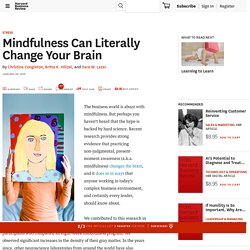

How to Get Employees Excited to Do Their Work. What keeps you up at night as a manager?

22 Habits That Will Make Your Life a Little More Peaceful Each Day 1.

Throw out, sell or donate everything you don't need. Use this guide to minimalism to help you decide what you're keeping in excess. If there's anything that will immediately release your anxiety and put you at ease, it's making the choice only to keep the physical things that either serve a purpose or hold a positive meaning for you. 2. Organize everything you do. 3. TED Talks to Help You Kick Ass at Work (and in Life) A Completely Non-Intimidating Guide to Writing (Infographic) The One Thing Everyone — Yes Everyone! — Really Wants. People may be very different, but there’s one thing everyone wants from friends and peers, research shows.

(Photo: Getty Images/Portra Images) You may not have a deep desire for a cushy job, designer duds, or a luxury car. But according to a new research review, everyone — yes, everyone — has the need for a high level of social status. Theorists have debated this question for decades: Is it human nature to want high standing in one’s social circle, profession, or society in general? So researchers from University of California, Berkeley’s Haas School of Business reviewed hundreds of studies to find out. Stand Out in Your Interview. How to Trick Yourself into Doing Tasks You Dread. For some of us, checking off each item on our to-do lists provides the endorphin rush we need to make task completion an intrinsic joy.

But most of us need a little extra motivation, especially for boring work like recording billable hours, uncomfortable tasks like facing awkward conversations with dissatisfied clients, or major projects like writing a complex case study. Setting up a compelling reward system can help you power through your to-dos. Here are four types of rewards to consider: Regenerative By rewarding yourself in a way that recharges your body and brain, you’ll give yourself more energy to tackle your next task or project. Examples of regenerative rewards include: Productive Often—hopefully—work is rewarding in and of itself: meeting with colleagues you respect and enjoy or crafting a PowerPoint deck that incorporates humor or favorite photographs.
Other examples of productive rewards include: Concurrent Some concurrent rewards include: Cumulative Examples include: Mindfulness Can Literally Change Your Brain. Executive Summary Mindfulness is a buzzword in the business world, but many don’t know that the hype is backed by hard science.

A 2011 study of participants who completed an eight-week mindfulness program found that the density of participants’ grey matter significantly increased. Compared to non-meditators, people who practice mindfulness demonstrate superior performance on tests of self-regulation and show more activity in the anterior cingulate cortex (ACC), which handles impulsivity and mental flexibility. The hippocampus, which is associated with emotion and memory and is important for resilience, also showed increased grey matter in the mindfulness program participants.
Mindfulness shouldn’t be considered just “nice-to-have” – it’s a must-have, keeping our brains healthy and protecting us from toxic stress. Signs That You Lack Emotional Intelligence. Executive Summary Often, emotional intelligence is the key differentiator between a star performer and the rest of the pack, yet many never embrace the skill for themselves.

Uk.businessinsider. GettyAlbert Einstein.

Cognitive science has come to a few conclusions about the mechanics of learning. For example, if you're trying to remember what you read, highlighting doesn't help. On the other hand, flash cards do. How to Handle 3 Types of Difficult Conversations. Many of us find ourselves in professional situations where we believe someone has wronged us, treated us badly, or just plain made us mad.

The expert advice often is to have the courage to have an honest conversation, air the grievance. No one can help you solve a problem if she doesn’t know you have it. But that’s easier said than done, right? It helps to have guiding principles to call on when you need to work through something difficult with a colleague. But the context of your discussion also matters. If you’re mad about a decision that affects you . . . Develop a Better Kind of Mental Toughness by Living like a Hydra. The First Step to Being Powerful. “I am such a big failure.

I can’t believe that I’ve made this mistake and it’s cost me months and months of time. I might never recover…What an idiot to not see that one coming.” On and on, he went. How to Spend the Last 10 Minutes of Your Day. How much sleep did you get last night?

If the answer is “not enough” you’re hardly alone. According to Gallup’s estimates, almost half the people you’ll run into today are suffering from some level of sleep deprivation. We often dismiss a little morning fatigue as an inconvenience, but here’s the reality. Who’s Doing Common-Sense Reasoning And Why It Matters. Editor’s note: Catherine Havasi is CEO and co-founder of Luminoso, an artificial intelligence-based text analytics company in Cambridge. Luminoso was founded on nearly a decade of research at the MIT Media Lab on how NLP and machine learning could be applied to text analytics. Catherine also directs the Open Mind Common Sense Project, one of the largest common sense knowledge bases in the world, which she co-founded alongside Marvin Minsky and Push Singh in 1999. How Turning My To-Dos into a Story Boosted My Memory and Solved My Procrastination Problem.
Very interesting, Thorin. I've been playing with the idea of transforming todos into stories, to give them some meaning and context, but I write notes about each todo. Sometimes I've tried to write stories about the todos, but it usually derives to the form of a diary, which is mostly boring, and not very useful, since it happens afterwards. Your approach has interesting differences: - third person point of view (you write as though you are not you) How to be fitter, happier and more successful: stop dreaming and start getting real. 6 Tricks To Becoming A More Positive Thinker. "There is nothing either good or bad, but thinking makes it so. " -- William Shakespeare When something goes horribly wrong, our emotions hardly feel like a choice.
It's logical to feel upset, angry or guilty about a negative situation, so it only makes sense to react accordingly, right? How Top Business Leaders Spend The Day. How To Be The Most Positive Person In The Room. No one wants to be -- or be around -- a Negative Nancy. Positive people encourage others to be happier and more comfortable with themselves because their energy is contagious. And with all the adversity we face in our lives, it's no wonder that kind of outlook is appealing. Studies show optimism certainly has its benefits. How To Be The Most Positive Person In The Room.
7696768c-2c3d-11e4-b021-22000a919507-large.jpeg (JPEG Image, 960 × 735 pixels) The Most Productive People Know Who to Ignore - Ed Batista. 9 Things Successful People Won't Do. How To Be More Productive: 15 Lesser-Known Ways To Boost Your Productivity. Smartphones, eating at your desk, cute cat videos, plants, and even more cat videos can make a person more productive. Science knows it. Your boss with a view of your computer screen knows it. How Successful People Reach Their Goals. Simple Ways To Reinvent Yourself At Work. The 9 Types of Intelligence By Howard Gardner... Life Advice From Jim Whittaker.
Be Kind to Yourself. Brain function 'boosted for days after reading a novel' - Science - News. Being pulled into the world of a gripping novel can trigger actual, measurable changes in the brain that linger for at least five days after reading, scientists have said. The new research, carried out at Emory University in the US, found that reading a good book may cause heightened connectivity in the brain and neurological changes that persist in a similar way to muscle memory. The changes were registered in the left temporal cortex, an area of the brain associated with receptivity for language, as well as the the primary sensory motor region of the brain. Neurons of this region have been associated with tricking the mind into thinking it is doing something it is not, a phenomenon known as grounded cognition - for example, just thinking about running, can activate the neurons associated with the physical act of running.
“We already knew that good stories can put you in someone else’s shoes in a figurative sense. Lonely? Or Lots Of Friends? Brain Structure Varies With Social Connectivity, Scientists Find. People who have extensive social networks have more connections in some parts of the brain, according to a new study. But researchers don't know yet what comes first - the brain structure or the social connections.
(Photo: Petr Kratochvil / Rhonda J. Miller) Having a wide circle of friends and thriving in social situations might mean you have more white-matter pathways in your brain. Maybe those white-matter pathways — the nerve fibers that connect the different regions of the brain — are one factor that makes it easier to function in social settings, or maybe spending lots of time in social situations creates more of those pathways. Either way, a new study has found that certain regions of the brain are bigger and better connected in people with a large network of friends and good social skills than in people with fewer friends, according to research presented at Neuroscience 2013, the annual meeting of the Society for Neuroscience in San Diego..
Like Us on Facebook. How to Support Your Child's Emotional Intelligence. There's so much talk about emotional intelligence these days, in fact, I just read an article in The New York Times about teaching it in schools.